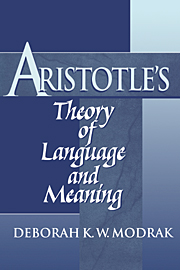9 - Conclusions
Published online by Cambridge University Press: 16 November 2009
Summary
This short chapter has two objectives: to review the interpretation of Aristotle's theory of meaning developed in this volume and to consider whether his theory of meaning can successfully answer philosophical challenges of both ancient and modern origins. The treatment of these topics will of necessity be brief and selective. The intent, especially in the case of modern theories, is to provoke discussion, not to settle questions that would demand a much more thorough investigation than is appropriate here.
Pulling the Threads Together
De Interpretatione 1 offers a terse explanation of meaning:
Spoken words then are symbols of affections of the soul [τωv έv τη ψυχη παθημάτωv] and written words are symbols of spoken words. And just as written letters are not the same for all humans neither are spoken words. But what these primarily are signs of, the affections of the soul, are the same for all, as also are those things [πράγματα] of which our affections are likenesses [όμоιώματα].
To understand this description, I have argued, we must interpret each of its parts within the context provided by Aristotle when he discusses the issues surrounding signification, ontology, and psychological processes. In Part I, Aristotle's conception of meaning and reference was explicated within the logical and ontological framework of the Organon. There the basic entities are simple subjects and their characteristics. For language and logic, the basic items are simple subjects and predicates. For epistemology and ontology, the basic units are simple substances and their properties and relations. Throughout, Aristotle assumes that the basic categories of language – knowledge and reality – are structural equivalents.
- Type
- Chapter
- Information
- Aristotle's Theory of Language and Meaning , pp. 265 - 278Publisher: Cambridge University PressPrint publication year: 2000



